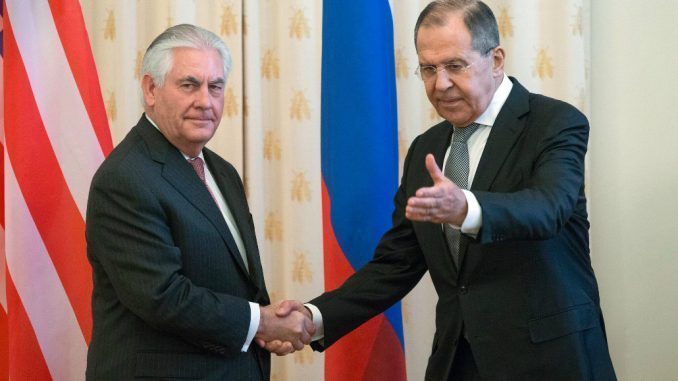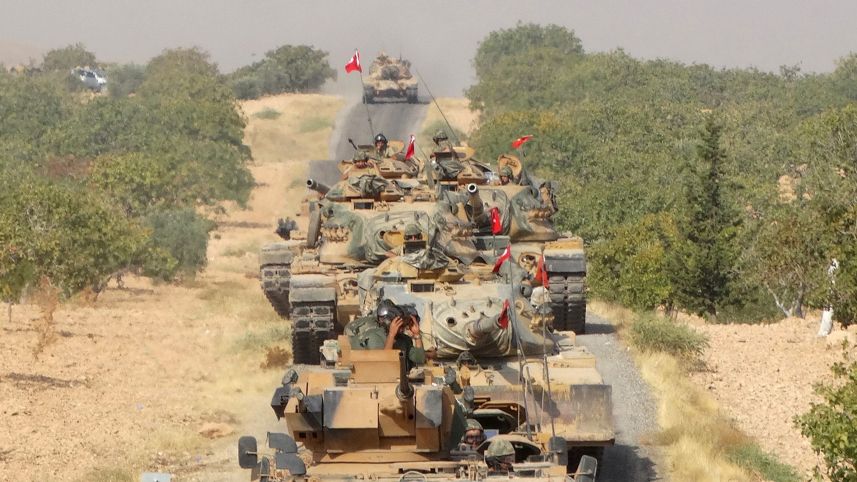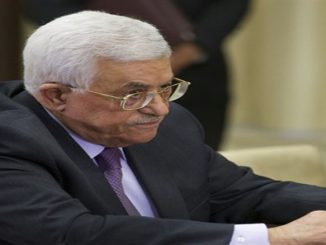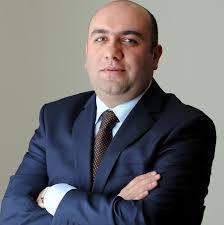
Russian president Vladimir Putin met with US secretary of state Rex Tillerson in Moscow on Wednesday amid increased tension between the two powers over the Syria’s issue.
More than 60 civilians were killed in Syria in a new chemical attack carried out by Assad regime’s air force on the rebel-held Idlib province last week.
In a sharp escalation of the U.S. military role in Syria, two U.S. warships fired dozens of cruise missiles from the eastern Mediterranean Sea at the airbase controlled by Assad regime forces from which the attack as carried out.
Trump ordered the strikes just a day after he pointed the finger at Assad for this week’s chemical attack.
“Tonight I ordered a targeted military strike on the airfield in Syria from where the chemical attack was launched.”
“Years of previous attempts at changing Assad’s behavior have all failed and failed very dramatically,” Trump said on Thursday.
Russia condemned the strikes, saying Washington’s action would “inflict major damage on US-Russia ties”, according to Russian news agencies.
But the US allies backed this move, calling for more pressure on Assad regime and blaming Russia for backing Assad accusing Putin of taking part in killing the Syrian civilians.
Tension before the meeting
Putin said in an interview before the meeting that the relation between the US and Russia are in its lowest state under Trump’s administration.
“The working level of confidence in Russian-American relations, especially at the military level, under the administration of Donald Trump, has not improved, but rather worsened,” he told MIR news.
In the briefing Tuesday, Putin suggested that Russia and Syria were being demonized.
“Everyone wants to restore relations with the Western community after — thanks to the former US administration — many European countries adopted an anti-Trump position during the election campaign,” he said.
“Syria and Russia, as a common enemy, provide a wonderful platform for consolidation. We are ready to put up with that for a while in the hope that it will eventually lead us to some positive trend based on interaction.”
Putin said that Russia had information that the United States was planning to launch new missile strikes on Syria and that there were plans to fake chemicals weapons attacks there.
“We have information that a similar provocation is being prepared … in other parts of Syria including in the southern Damascus suburbs where they are planning to again plant some substance and accuse the Syrian authorities of using (chemical weapons),” he said, without offering any proof for the assertion.
Putin said the US was using the same tactic it did in the lead-up to the Iraq war.
“This reminds me very much of the events of 2003 when US representatives in the Security Council showed alleged chemical weapons discovered in Iraq. A military campaign in Iraq ensued, which ended with the destruction of the country, an increased terrorist threat and the emergence of ISIS on the international scene,” Putin said. “The exact same thing is happening now, and their partners are nodding approvingly.”
Meeting with Putin
Tillerson went to the Kremlin to meet the Russian president, the US embassy and the Kremlin said.
Though Donald Trump has spoken with Putin by phone, the meeting was believed to be the first between Putin and a top member of Trump’s administration since the new US president took office in January.
The agenda for the meeting wasn’t announced. The two were expected to discuss their dispute over whether Syrian president Bashar al-Assad or his opposition was responsible for a chemical weapons attack last week that led to US retaliatory cruise missiles. Conflicts over Russia’s actions in Ukraine and Russia’s alleged interference in the US presidential campaign were also likely topics.
While the US secretary of state’s decision to skip a Nato summit and visit Moscow initially seemed to highlight the White House’s desire for better relations with Russia, expectations shifted after Donald Trump launched cruise missile strikes on a Syrian airbase last week, a move condemned by the Kremlin.
The days when Russian politicians talked about better relations and state television trumpeted Trump as a “real man” were clearly over.
The question is not so much whether Tillerson can reach an agreement on Syria, but whether he can start any sort of dialogue at all.
Warnings and complaints in meeting with Lavrov
This meeting came after a meeting with the Russian Foreign Minister Sergey Lavrov.
The talks come after Lavrov issued Tillerson a warning Wednesday against any further US strikes on the Syrian regime. Russia is Syria’s most powerful ally.
Lavrov gave Tillerson an icy welcome Wednesday, diving straight into Moscow’s grievances with Washington in what would usually be warm opening remarks.
Russia “saw some very troubling actions regarding the attack on Syria,” he said, according to an official Russian interpreter.
“We believe it is fundamentally important not to let these actions happen again.”
Lavrov also complained about the mixed messages coming out of Washington on the Trump administration’s policy on Syria, with the US envoy to the UN, Nikki Haley, making clear Assad should have no future in Syria as Tillerson took a softer line.
“I will be frank that we had a lot of questions regarding a lot of very ambiguous as well as contradictory ideas on a whole plethora of bilateral and international agenda coming from Washington,” Lavrov said.
He hit back at remarks Tillerson made a day earlier that Russia would have to decide whether it was with the US and the West in standing up against Assad, or against them, describing the comments as “wrong choices.”
Tillerson took a more diplomatic tone in his opening remarks, saying that he hoped to clarify “areas of common objectives, areas of common interests, even when our tactical approaches may be different.”
“And to further clarify areas of sharp difference, so we can better understand why these differences exist and what the prospects for narrowing those differences may be.”
Can a common ground be reached?
In a hint that Moscow might still be willing to negotiate, the foreign ministry spokeswoman Maria Zakharova said Tillerson’s statement was not an ultimatum but rather just “muscle-flexing before talks”. While the vice-speaker of parliament, Pyotr Tolstoy, told Interfax news agency that no breakthrough could be expected at the negotiations, he said the fact they were going ahead was a good sign, “because there could have been none at all”.
He warned that any attempts to adopt further sanctions against Russia “won’t result in anything”. But such a threat was quashed on Tuesday when the G7 summit in Italy refused to back a British call for new sanctions, a small victory for Moscow.
Any agreement about Assad’s future was clearly off the table on Wednesday, as was an east-west partnership against the Islamic State, about which both Trump and Putin have spoken in the past. Moscow’s major bargaining chip – the help of Russian and Syrian forces in fighting Isis – was no longer good now that the “Syrian army has become a military adversary” of the United States, Baunov said.
But a more narrow agreement about how to avoid an accident that could escalate into direct conflict between Russia and the United States remained a possibility, if not a necessity. After the missile strikes, Russia announced it would cancel a deconfliction agreement established with the United States in 2015. However, US officials said on Friday the hotline between the two countries’ militaries, which is designed to avoid midair collisions between Russian jets and those of the US-led coalition, was still working. The Russian defence ministry later said this line of communications would be cut at midnight on Saturday.
Besides its air campaign, Russia has a large number of military advisers on the ground in Syria, including two soldiers who were reportedly killed in a mortar attack on Tuesday. If the United States continues missile strikes against Syrian government positions, Russian troops would be at risk.
“There’s a chance to agree on technical issues about how to separate [forces], to not clash,” said Alexei Makarkin, a political analyst. “On the more global issues, the issue of Assad, their positions are diametrically opposed.”
Trump’s future strategy in Syria remains unclear, which could further complicate the conversation with Russia, but Baunov and Makarkin expected Tillerson to nonetheless take a hard line on Moscow’s involvement in the country. If the new secretary of state failed to display Kerry’s patience to continue talking and “look for the smallest chance for agreement” with Russia, however, his harsh rhetoric could backfire, Makarkin said.
“These ultimatums won’t work,” he said, “except to bring Russia and Assad closer together.”
The Syrian crisis began as a peaceful demonstration against the injustice in Syria. Assad regime used to fire power and violence against the civilians and led to armed resistance. 450.000 Syrians lost their lives in the past five years according to UN estimates, and more than 12 million have lost their homes.



